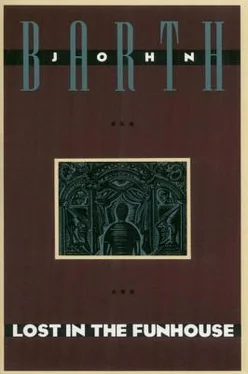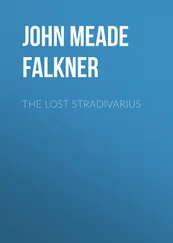John Barth - Lost in the Funhouse
Здесь есть возможность читать онлайн «John Barth - Lost in the Funhouse» весь текст электронной книги совершенно бесплатно (целиком полную версию без сокращений). В некоторых случаях можно слушать аудио, скачать через торрент в формате fb2 и присутствует краткое содержание. Год выпуска: 2014, ISBN: 2014, Издательство: Knopf Doubleday Publishing Group, Жанр: Современная проза, на английском языке. Описание произведения, (предисловие) а так же отзывы посетителей доступны на портале библиотеки ЛибКат.
- Название:Lost in the Funhouse
- Автор:
- Издательство:Knopf Doubleday Publishing Group
- Жанр:
- Год:2014
- ISBN:978-0-8041-5250-1
- Рейтинг книги:3 / 5. Голосов: 1
-
Избранное:Добавить в избранное
- Отзывы:
-
Ваша оценка:
- 60
- 1
- 2
- 3
- 4
- 5
Lost in the Funhouse: краткое содержание, описание и аннотация
Предлагаем к чтению аннотацию, описание, краткое содержание или предисловие (зависит от того, что написал сам автор книги «Lost in the Funhouse»). Если вы не нашли необходимую информацию о книге — напишите в комментариях, мы постараемся отыскать её.
Lost in the Funhouse — читать онлайн бесплатно полную книгу (весь текст) целиком
Ниже представлен текст книги, разбитый по страницам. Система сохранения места последней прочитанной страницы, позволяет с удобством читать онлайн бесплатно книгу «Lost in the Funhouse», без необходимости каждый раз заново искать на чём Вы остановились. Поставьте закладку, и сможете в любой момент перейти на страницу, на которой закончили чтение.
Интервал:
Закладка:
Only once did Mother allude to my namelessness, some two or three months after my birth. I was lying in Aunt Rosa’s lap, drinking from a bottle; dinner was just done; the family lingered over coffee. Suddenly Andrea, on one of her impulses, cried “Give him here, Rose!” and snatched me up. I made a great commotion.
“Now, you frightened it,” Rosa chided.
Andrea ignored her. “ ’E doesn’t want Rosie’s old bottle, does Christine.”
Her croon failed to console me. “Hold him till I unbutton,” she said — not to Rosa but to Uncle Konrad. Her motives, doubtless, were the usual: to make Aunt Rosa envious, amuse Grandfather, and mortify Uncle Konrad, who could not now readily look away. She undid her peignoir, casually bemoaning her abundance of milk: it was making her clothes a sight, it was hurting her besides, she must nurse me more regularly. She did not at once retrieve me but with such chatter as this bent forward, cupped her breast, invited me to drink the sweet pap already beading and spreading under her fingers. Uncle Konrad, it was agreed, at no time before or after turned so crimson.
“Here’s what the Honey wants,” Andrea said, relieving him finally of his charge. To the company in general she declared, “It does feel good, you know: there’s a nerve or something runs from here right to you-know-where.”
“Schämt euch!” Aunt Rosa cried.
“ Ja sure,” Grandfather said merrily. “You named it!”
“No, really, she knows as well as I do what it’s like. Doesn’t she, Christine. Sure Mother likes to feed her little mannie, look how he grabs, poor darling.…” Here she was taken unexpectedly with grief; pressed me fiercely to her, drew the peignoir about us; her tears warmed my forehead and her breast. “Who will he ever be, Konrad? Little orphan of the storm, who is he now?”
“Ah! Ah!” Rosa rushed to hug her. Grandfather drew and sucked upon his meerschaum, which however had gone dead out.
“Keep up like you have been,” Konrad said stiffiy; “soon he’ll be old enough to pick his own name.” My uncle taught fifth grade at East Dorset School, of which Hector had been principal until his commitment, and in summers was a vendor of encyclopedias and tuner of pianos. To see things in their larger context was his gentle aim; to harmonize part with part, time with time; and he never withheld from us what he deemed germane or helpful. The American Indians, he declared now, had the right idea. “They never named a boy right off. What they did, they watched to find out who he was. They’d look for the right sign to tell them what to call him.”
Grandfather scratched a kitchen match on his thumbnail and relit his pipe.
“There’s sense in that,” Uncle Konrad persevered. “How can you tell what name’ll suit a person when you don’t know him yet?”
Ordinarily Rosa was his audience; preoccupied now with Andrea, she did not respond.
“There’s some name their kids for what they want them to be. A brave hunter, et cetera.”
“Or a movie star,” Mother offered, permitting Rosa to wipe her eyes.
“Same principle exactly,” Konrad affirmed, and was grateful enough to add in her behalf, despite his late embarrassment: “It’s an important thing, naming a child. If I had a boy, I’d be a good long time about it.”
“ Ach, ” Grandfather said. “You said that right.”
Andrea sniffed sympathy but did not reply, and so Uncle Konrad enlarged no further. Too bad for Grandfather his restlessness moved him from the table, for by this time my mother was herself sufficiently to turn back the veil she’d drawn about us.
“Well,” she sighed to me. “You’ve caused the devil’s mischief so far. Your daddy in the crazy-house; people saying Lord knows what about your mother.”
“Thank Almighty God you got him,” Aunt Rosa said. “And born perfect only for his little mark. Look how wide and clear his eyes!”
Uncle Konrad unbent so far as to pat my head while I nursed, a boldness without known precedent in his biography. “That’s a sign of brains,” he declared. “This boy could be our pride and saving.”
Mother’s laugh took on a rougher note. But she caressed my cheek with her knuckle, and I nursed on. Her temper was gay and fond now; yet her breast still glistened with the tears of a minute past. Not just that once was what I drank from her thus salted.
Grandfather would have no whisky or other distillation in the house, but drank grandly of wines and beers which he made himself in the whitewashed sheds behind the summerkitchen. His yeast and earliest grapestock were German, imported for him by the several families he’d brought to the county. The vines never flourished: anon they fell victim to anthracnose and phylloxera and were replaced by our native Delawares, Nortons, Lenoirs; but the yeast — an ancient culture from Sachsen-Altenburg — throve with undiminished vigor in our cellar. With it he would brew dark Bavarian lager, pellucid Weiss, and his cherished Dortmund, pale gold and strongly hopped. Yet vinting was his forte, even Hector agreed. What he drew from the red and white grapes was splendid enough, but in this pursuit as in some others he inclined to variety and experiment: without saccharimeter or any other aid than a Rhenish intuition, he filled his crocks as the whim took him with anything fermentable — rice, cherries, dandelions, elderberries, rose petals, raisins, coconut — and casked unfailingly a decent wine.
Now it was Uncle Konrad’s pleasure to recite things on occasion to the family, and in 1929, hearing by this means verses of Macpherson’s Ossian, Grandfather had been inspired with a particular hankering for mead. From a farmer whose payments on a footstone were in arrears, he accepted in lieu of cash a quantity of honey, and his fermentation was an entire success. The craving got hold of him, he yearned to crush walnuts in the golden wort — but honey was dear, and dollars, never plentiful in the family, there were none for such expenditure. The stock market had fallen, the tomato-canners were on strike, hard times were upon the nation; if funerals were a necessity, gravestones were not; Uncle Karl, Grandfather’s right-hand man, had left town two years past to lay bricks in Baltimore; our business had seldom been poorer.
“There is a trick for finding bee-trees,” Grandfather asserted. One exposed a pan of sugar-water in the woods, waited until a number of honeybees assembled at it, and trapped them by covering the pan with cheesecloth. One then released a single bee and followed it, pan in hand, till it was lost from sight, whereupon one released another bee, and another, and another, and was fetched at length to their common home. It remained then only to smoke out the colony and help oneself to their reserves of honey. All that winter, as I grew in Mother’s womb, Grandfather fretted with his scheme; when the spring’s first bees appeared on our pussywillows, on our alder catkins, he was off with Hector and Konrad, saucepan and cheesecloth. Their researches led them through fresh-marsh, through pinewoods, over stile and under trestle — but never a bee-tree they discovered, only swampy impasses or the hives of some part-time apiarist.
My birth — more exactly, Hector’s notion that someone other than himself had fathered me; his mad invasion of the delivery room; his wild assertion, as they carried him off, that the port-wine stain near my eye was a devil’s mark — all this commotion, naturally, ended the quest. Not, however, the general project. Out of scrap pine Grandfather fashioned a box-hive of his own, whitewashed and established it among the lilacs next to the goat-pen, and bade Uncle Konrad keep his eyes open for a migrant swarm, the season being opportune.
Читать дальшеИнтервал:
Закладка:
Похожие книги на «Lost in the Funhouse»
Представляем Вашему вниманию похожие книги на «Lost in the Funhouse» списком для выбора. Мы отобрали схожую по названию и смыслу литературу в надежде предоставить читателям больше вариантов отыскать новые, интересные, ещё непрочитанные произведения.
Обсуждение, отзывы о книге «Lost in the Funhouse» и просто собственные мнения читателей. Оставьте ваши комментарии, напишите, что Вы думаете о произведении, его смысле или главных героях. Укажите что конкретно понравилось, а что нет, и почему Вы так считаете.












